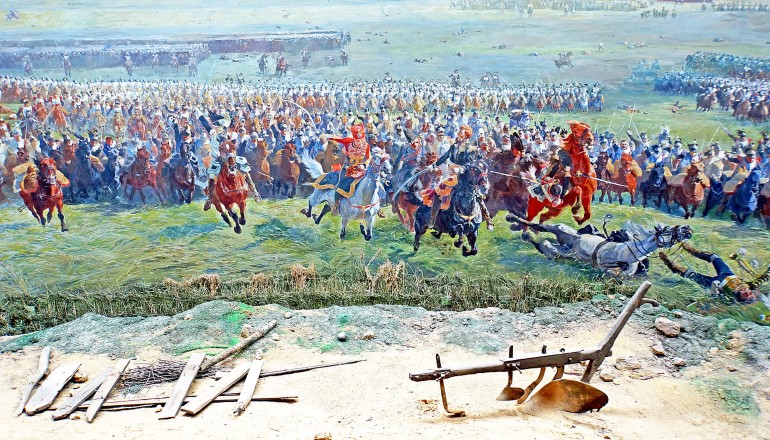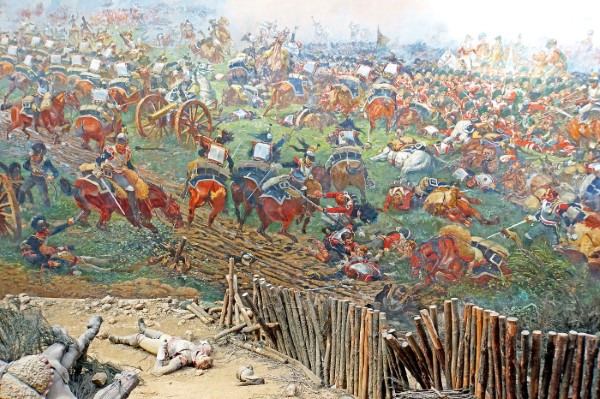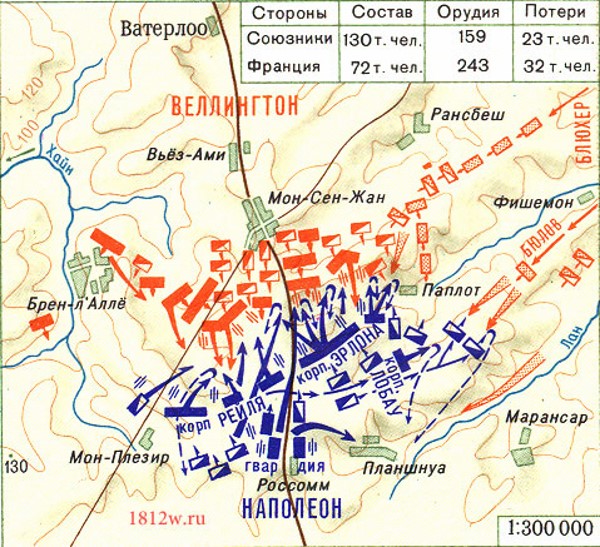
The Battle of Waterloo 200 Years Later
/ Главная / Russkiy Mir Foundation / Publications / The Battle of Waterloo 200 Years LaterThe Battle of Waterloo 200 Years Later

Today marks the 200th anniversary of perhaps the most famous battle of all times – the Battle of Waterloo, which occurred on June 18, 1815. This was not the largest battle in terms of the number of participants or in the number of fallen; however, it is one of the most vivid episodes in military history. The reason for this is clear: this is when the allied forces managed to put an end to the career of a genius military leader who had terrorize all of Europe – Napoleon Bonaparte.
Russia did not have a formal role in this battle, where the participants, in addition to Napoleon’s army assembled upon his return from Elba, included British-Dutch forces commanded by the Duke of Wellington and, in the final phase, a Prussian army under the command of Gebhard von Blücher. Nonetheless, this is part of European history which is well-known and remembered in Russia, if for no other reason than the fact that our country was for many years the main force in the anti-Napoleon coalition in Europe.
The reemergence of Napoleon’s empire was countered by the quickly assembled 7th Coalition of European states, which not only included the main powers which defeated Napoleon in 1813-1814, but also other states which participated in the Congress of Vienna of 1814-1815.

The coalition forces included the following armies: British-Dutch (106,000 under the command of the Duke of Wellington), Army of the Lower Rhine (251,000 under the command of Gebhard von Blücher), Army of the Middle Rhine (168,000 under the command of Michael Andreas Barclay de Tolly), Army of the Upper Rhine (254,000 under the command of Charles Philip, Prince of Schwarzenberg) as well as two supplemental Austrian and Piedmont armies (approximately 80,000 strong). The forces were concentrated along a line stretching from Belgium to the middle and upper Rhine and then to Piedmont along the border with France, and they were set to march on Paris. Napoleon I, with his 200,000 soldiers and 150,000 national guard, decided to take the initiative and attack them separately. The main forces of the French army moved to Belgium and in the Battle of Ligny succeeded in partially defeating the Army of the Lower Rhine, forcing the Prussian forces to retreat. Napoleon ordered Marshal Emmanuel de Grouchy together with his corps of 33,000 soldiers to pursue the Prussians. However, de Grouchy acted indecisively and was unable to prevent the Army of the Lower Rhine from maneuvering to return to action in the decisive battle.
By June 17, the main French forces (72,000 troops and 243 pieces of artillery) were concentrated in near La Belle-Alliance, Rossomme and Plancenoit. But Napoleon, who was counting on de Grouchy to isolate the Prussian forces, did not hurry to engage Wellington’s army, which had taken up a defensive position to the south of Waterloo along the heights overlooking the road to Brussels. Wellington succeeded in sheltering his troops from French artillery fire behind the hills.
The battle began at 11:00 in the morning of June 18. Napoleon decided to attack the left flank of Wellington’s army in order to prevent it from joining up with the Prussian army. The II Corps under the command of Honoré Reille was to distract Wellington’s right flank with demonstrative attacks. However, the resistance of the coalition forces at Château d'Hougoumont undermined Napoleon’s plans. Reille gradually engaged his entire corps in the battle without achieving any success by the end of the day. The act on the left flank of Wellington’s army by four divisions of Comte d'Erlon, which began at 14:00 also failed to achieve its aims and the attacking forces took on heavy losses from artillery fire. The French artillery was largely ineffective as it was situated too far away from the attacking columns.

In the second half of the day the advanced guard of Blücher’s army reached Frichermont. Napoleon was forced to send a 10,000-strong force under the command of Count Lobau and later part of his guards. Simultaneously he changed the focus of the main attack on the center of Wellington’s army. However, the repeated attacks of the French achieved no success. Ney’s cavalry attacks twice broke through the lines of Wellington’s army, yet lacking reinforcement by infantry they were forced to fall back. Napoleon’s final attempt to break through the center lines of his opponent by sending in his reserves – 10 battalions of the Old Guard – also failed to achieve its objective. The balance of forces at that time already favored the coalition forces – three Russian corps with 130,000 soldiers had arrived.
At 20:00 the main forces of the British-Dutch army went on the offensive across the front as the Prussians hit the right flank of the French forces. Napoleon’s forces began to falter and fall back. The retreat then turned in outright flight.
At the Battle of Waterloo the French lost 32,000 men and all of their artillery. The coalition forces lost 23,000. Napoleon fled to Paris, where on June 22 he resigned. Later he was exiled to the Island of St. Helena.
RIA Novosti
New publications

 Mikhail Kalatozov, a director who transformed the world of cinematography in many ways, was born 120 years ago. He was a Soviet film official and a propagandist. Above all, he was capable of producing movies that struck viewers with their power and poetic language.
Mikhail Kalatozov, a director who transformed the world of cinematography in many ways, was born 120 years ago. He was a Soviet film official and a propagandist. Above all, he was capable of producing movies that struck viewers with their power and poetic language.  Ukrainian authorities have launched a persecution campaign against the canonical Ukrainian Orthodox Church (UOC), the biggest one in the country's modern history. Over the past year, state sanctions were imposed on clergy representatives, searches were conducted in churches, clergymen were arrested, criminal cases were initiated, the activity of the UOC was banned in various regions of the country, and monasteries and churches were seized.
Ukrainian authorities have launched a persecution campaign against the canonical Ukrainian Orthodox Church (UOC), the biggest one in the country's modern history. Over the past year, state sanctions were imposed on clergy representatives, searches were conducted in churches, clergymen were arrested, criminal cases were initiated, the activity of the UOC was banned in various regions of the country, and monasteries and churches were seized.  When Nektary Kotlyaroff, a fourth-generation Russian Australian and founder of the Russian Orthodox Choir in Sydney, first visited Russia, the first person he spoke to was a cab driver at the airport. Having heard that Nektariy's ancestors left Russia more than 100 years ago, the driver was astonished, "How come you haven't forgotten the Russian language?" Nektary Kotlyaroff repeated his answer in an interview with the Russkiy Mir. His affinity to the Orthodox Church (many of his ancestors and relatives were priests) and the traditions of a large Russian family brought from Russia helped him to preserve the Russian language.
When Nektary Kotlyaroff, a fourth-generation Russian Australian and founder of the Russian Orthodox Choir in Sydney, first visited Russia, the first person he spoke to was a cab driver at the airport. Having heard that Nektariy's ancestors left Russia more than 100 years ago, the driver was astonished, "How come you haven't forgotten the Russian language?" Nektary Kotlyaroff repeated his answer in an interview with the Russkiy Mir. His affinity to the Orthodox Church (many of his ancestors and relatives were priests) and the traditions of a large Russian family brought from Russia helped him to preserve the Russian language.

 The leaders of the Friends of the Great Russia cultural association (Amici Della Grande Russia) in Italy believe that the Western policy of abolishing Russian culture in Europe has finally failed. Furthermore, it was doomed to failure from the beginning.
The leaders of the Friends of the Great Russia cultural association (Amici Della Grande Russia) in Italy believe that the Western policy of abolishing Russian culture in Europe has finally failed. Furthermore, it was doomed to failure from the beginning.  Name of Vladimir Nemirovich-Danchenko is inscribed in the history of Russian theater along with Konstantin Stanislavski, the other founding father of the Moscow Art Theater. Nevertheless, Mr. Nemirovich-Danchenko was a renowned writer, playwright, and theater teacher even before their famous meeting in the Slavic Bazaar restaurant. Furthermore, it was Mr. Nemirovich-Danchenko who came up with the idea of establishing a new "people's" theater believing that the theater could become a "department of public education."
Name of Vladimir Nemirovich-Danchenko is inscribed in the history of Russian theater along with Konstantin Stanislavski, the other founding father of the Moscow Art Theater. Nevertheless, Mr. Nemirovich-Danchenko was a renowned writer, playwright, and theater teacher even before their famous meeting in the Slavic Bazaar restaurant. Furthermore, it was Mr. Nemirovich-Danchenko who came up with the idea of establishing a new "people's" theater believing that the theater could become a "department of public education."  "Russia is a thing of which the intellect cannot conceive..." by Fyodor Tyutchev are famous among Russians at least. December marks the 220th anniversary of the poet's birth. Yet, he never considered poetry to be his life's mission and was preoccupied with matters of a global scale. Mr.Tyutchev fought his war focusing on relations between Russia and the West, the origins of mutual misunderstanding, and the origins of Russophobia. When you read his works today, it feels as though he saw things coming in a crystal ball...
"Russia is a thing of which the intellect cannot conceive..." by Fyodor Tyutchev are famous among Russians at least. December marks the 220th anniversary of the poet's birth. Yet, he never considered poetry to be his life's mission and was preoccupied with matters of a global scale. Mr.Tyutchev fought his war focusing on relations between Russia and the West, the origins of mutual misunderstanding, and the origins of Russophobia. When you read his works today, it feels as though he saw things coming in a crystal ball...